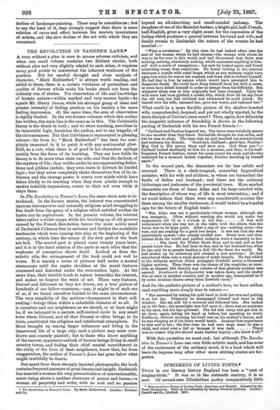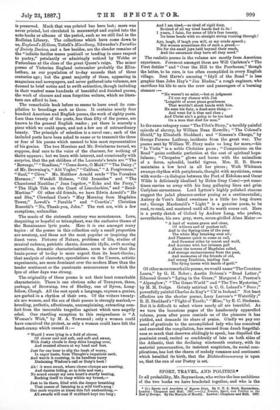SPECIMENS OF LIVING POETS.•
TWIOR in our literary history England has been a "nest of singing-birds." It was so in the sixteenth century, it is so now. Of second-rate Elizabethan poetry comparatively little • lispresentatirs Poems of Lining Ports, American and English. Selected by the Poets themselves. With an Introduction by George Parsons Lathrop, London SeMall and Co., Limited. 1886. is preserved. Mach that was printed has been lost ; more was never printed, but circulated in manuscript and copied into the note-books or albums of the period, such as we still find in the Bodleian Library. The collections which have come down to us, Dngland's Helicon, Tottell'e Miscellany, Edwardes's Paradise of Dainty Devices, and a few besides, are the slender remains of the "infinite fardles meere poeticall or tending in some respect to poetry," petulantly or admiringly noticed by Webbe or Pattenham at the close of the great Queen's reign. The minor poems of Victorian England outnumber probably the Eliza- bethan, as our population of to-day exceeds that of three centuries ago ; but the great majority of these, appearing in magazines and newspapers, and never gathered into volumes, are doomed to brief notice and to swift extinction, though including in their wastrel mass hundreds of beautiful and finished poems, the work of obscure and soon forgotten writers, which no litera- ture can afford to lose.
The remarkable book before us seems to have owed its com- pilation to broodings such as these. It contains nearly four hundred American and English poems, the work of eighty poets. Less than twenty of the poets, less than fifty of the poems, are known to the general English reader ; yet there is scarcely a piece which we could spare, and not a few are of extraordinary beauty. The principle of selection is a novel one ; each of the included poets have been asked to name or to transmit the three or four of his poems which seemed to him most representative of his genius. The two Morrises and Mr. Swinburne turned, we suppose, deaf ears to the voice of the charmer, for nothing of theirs appears ; but we learn with interest, and occasionally with surprise, that the pet children of the Laureate's brain are " The `Revenge," "Boadicea," "Come down, 0 Reidy' "The Daisy ;" of Mr. Browning's, " Abt Vogler," " Caliban," "A Forgiveness," " Saul," " Clive." Mr. Matthew Arnold sends " The Forsaken Merman ;" Wendell Holmes, "Old Ironsides " and "The Chambered Nautilus ;" Jean Ingelow, " Echo and the Ferry," " The High Tide on the Coast of Lincolnshire," and " Sand- Martins." Of other old friends, we have Edwin Arnold's " He and She," Cleveland Coxe's "May Morning from Magdalen Tower," Lowell's " Parable " and " Courtin'," Christina Rossetti's "No, Thank-you, John." The rest are, with a few exceptions, unfamiliar.
The music of the sixteenth century was monotonous. Love, despairing or hopeful or triumphant, was the exclusive theme of the Renaissance lyrics poets. Here it is one amongst many topics : of the poems in this collection only a small proportion are amatory, and those not the most popular or inspiring the finest verse. Pictures of Nature, problems of life, studies of musical cadence, patriotic chants, domestic idylls, swift moving narratives, dramatic characterisations, seem to show that the brain-power of to-day is more urgent than its heart-throbs ; that analysis of character, speculations on the Unseen, artistic experiments, are more dominant over the modern Muse than the tender sentiment or the passionate sensuousness to which the lyre of other days was strung.
The originality of these poems is not their least remarkable characteristic. There is one obvious echo of Tennyson, three, perhaps, of Browning, two of Shelley, one of Byron, Long- fellow, Clough. All the rest speak a language, express a genius, are garbed in a rhythm of their own. Of the writers twenty- six are women, and the sex of their poems is strongly marked,— brooding, pathetic, affectionate, uncomplaining, extracting com- fort from the inexorable tragedies against which men angrily rebeL One startling exception to this resignedness is "A Woman's Wish," by M. A. Townsend ; only a woman could have conceived the protest, as only a woman could have felt the heart-cramp which caused it :—
" Would I were lying in a field of clover, Of clover cool and soft, and soft and sweet, With dusky clouds in deep skies hanging over,
And scented silence at my head and feet. Just for one hoar to slip the leash of worry, In eager haste, from Thought's impatient neck, And watch it coursing, in its heedless harry
Disdaining Wisdom's call or Duty's beck !
Ah ! it were sweet, where clover-clumps are meeting, And daisies hiding, so to hide and rest; No sound except my own heart's sturdy beating, Rocking itself to sleep within my breast,— Just to lie there, filled with the deeper breathing
That comes of listening to a wild bird's song ! Our souls require at times this fall unsheathing,— All swords will mat if scabbard-kept too long ;
And I am tired,—so tired of rigid duty, So tired of all my tired hauda find to do !
I yearn, I faint, for some of life's free beauty,
Its loose beads with no straight string running through !
Aye, laugh, if laugh you will, at my crude speech; But women sometimes die of such a greed,— Die for the small joys held beyond their reach, And the assurance they have all they need."
The realistic poems in the volume are mostly from American experience. Foremost amongst them are Will Carleton's "The First Settler " and " Over the Hill to the Poorhouse," though the latter, to be sure, is too often exemplified in every English village. Bret Harte'e amusing "Idyll of the Road" is lees graphic than John Hay's "Jim Bludso," a rough engineer, who sacrifices his life to save the crew and passengers of a burning steamer:—
"Es weren't no saint,—but at lodgment I'd ran my chance with Jim 'Longside of some pious gentlemen That wouldn't shook hands with him.
He seen hie duty, a dead-sure thing,—
And went for it thar and then ; And Christ ain't a going to be too bard On a man that died for men."
In the same category come " The Pilot's Story," a terribly painful episode of slavery, by William Dean Howells ; "The Colonel's Shield," by Elizabeth Stoddard ; and " Keenan's Charge," by George Parsons Lathrop, incidents from the great war. The poems sent by William W. Story make us long for more,—his " Io Victis " is a noble Christian pman ; " Companions on the Road " gains resthetic perfection at the cost of spiritual hope- fulness ; " Cleopatra " glows and burns with the animalism of a fierce, splendid, lustful tigress. Mrs. H. B. Stowe maintains a low level in all her pieces ; Walt Whitman swamps rhythm with periphrasis, thought with mysticism, sense with words—(a dialogue between the Poet of Eidolons and Oscar Wilde is deliciously idealised by Helen Gray Cone)—yet some- times carries us away with his long galloping lines and grim Carlylese earnestness. Lord Lytton's highly polished stanzas suggest the jaded pleasure-seeker posing as a sentimentalist; Aubrey de Vere'e linked sweetness is a little too long drawn out ; George Macdonald's " Light " is a genuine poem, to be read, re-read, and mastered until all its worth comes out. Here is a pretty sketch of Oxford by Andrew Lang, who prefers, nevertheless, his own grey, worn, ocean-girdled Alma Mater :— "A land of waters green and clear,
Of willows and of poplars tall, And in the Spring-time of the year The white May breaking over all; And Pleasure quick to come at call, And Summer rides by marsh and weld, And Autumn with her crimson pall About the towers of Magdalen rolled,
And strange enchantments from the past,
And memories of the friends of old, And strong Tradition, binding fast
The flying terms with bands of gold."
Of other more remarkable poems, we would name "The Countess Laura," by G. H. Boker ; Austin Dobson's "Dead Letter;" Edmund Goose's "Lying in the Grass ;" Margaret J. Preston's "Alpenglow ;" "The Grass-World" and "The Two Mysteries," by M. M. Dodge. Grimly satirical is C. G. Leland's "Buzz ;" powerfully painful Charles de Kay's" Ulf in Ireland." Not least effective are the shorter poems, Lucy Larcom's " Waterlily ;" R. H. Stoddard's "Flight of Youth;" " Mine," by E. C. Stedman. But it is difficult to select where nearly all are beautiful. As we turn the luxurious pages of the handsomely apparelled volume, poem after poem reminds us of the pleasure it has yielded, and demands its share of praise. Gladly we pay our mead of gratitude to the accomplished lady who has conceived and executed the compilation, has rescued from dumb forgetful- ness so much that deserves abidingly to speak, has dispelled the pessimist creed, recited so confidently of late on both sides of the Atlantic, that the declining nineteenth century, with its material preoccupation, its insistent scepticism, its social com- plications, has lost the charm of melody romance and sentiment which heralded its birth, that the Dichterdasnmerung is upon us, that the sun of our Poetry is set.



































 Previous page
Previous page